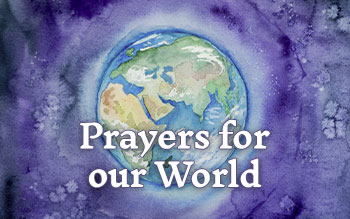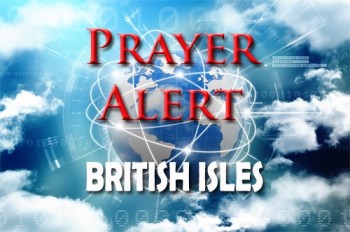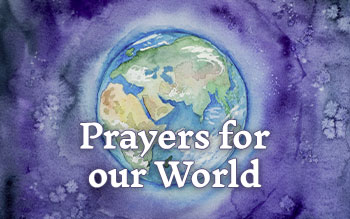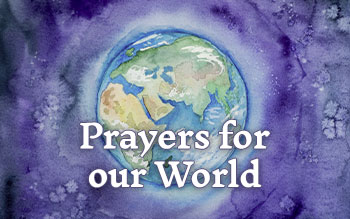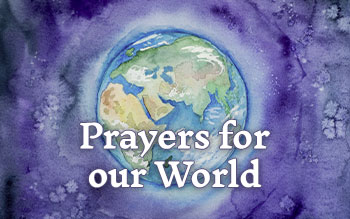Displaying items by tag: Iran
IRAN: Believers targeted amid US-Iran tensions
Iran (MNN) — Tensions rise between the United States and Iran amid sanctions, threats, and fights over missiles, nuclear deals, oil stores, and shipping routes.
Last week, Iran tested ballistic missiles as the U.S. worked with allies to safeguard ships in the Strait of Hormuz. According to Middle East Monitor, Russia predicts “full-scale armed conflict” in the region.
Unfortunately, these sky-high political tensions have led to a crackdown within Iran, explains Heart 4 Iran’s Mike Ansari. “In the last few weeks, [the] Iranian government has announced the arrest of multiple Iranian citizens who were allegedly CIA spies,” he says.
“In light of the recent sanctions, Iranian authorities are increasing the pressure on Western governments to loosen up the restrictions imposed on Iran.”
Authorities often target believers for accusation and arrest.
Life for believers inside Iran
Earlier this year, Open Doors USA placed Iran at #9 on its World Watch List – a ranking of 50 nations where following Christ is most difficult. By law, Christians cannot share their faith with non-Christians. Believers from a Muslim background face the most oppression because Islamic law governs Iran; society views converts as apostates.
“In Iran, conversion from Islam to Christianity – known as apostasy – is strictly forbidden. In fact, Iranian religious rulers have publicly advocated for the death penalty as a punishment for apostasy,” Ansari explains.
“When a Muslim converts to Christianity, they are warned, persecuted, [sometimes] arrested, and their belongings are confiscated.”
For converts who leave Iran, return could mean imprisonment and severe persecution. “Case in point – Mrs. Fatemeh Azad, a 58-year-old Iranian convert to Christianity who fled Iran, sought refuge in Germany, but was denied asylum and deported back to Iran,” Ansari describes.
“Upon her return, she was arrested and released on bail.”
As reported here by International Christian Concern:
When Fatemeh made her asylum appeal, her lawyers argued that apostasy (conversion away from Islam) is punishable by the death penalty in Iran. This penalty has not been issued in Iran for several years, in large part thanks to international pressure. However, Iran regularly imprisons converts for years. Christians are commonly charged with “acting against national security” and can face a prison sentence of up to 15 years with this charge.
“The Iranian Christian community in diaspora is concerned with the safety and well-being of Mrs. Azad while she resides in Iran,” Ansari says.
How to help
Mrs. Azad’s case represents a larger challenge, he adds. That’s an urgent matter for which you can pray.
“The real concern for Mrs. Azad is that Iranian authorities may use her as a pawn to not only instil fear in the heart of their own people but challenge the international community on human rights and religious freedom in Iran.”
Ask the Lord to comfort and encourage Fatemeh Azad during her imprisonment. Pray for her safety, Ansari requests, and “pray for the multitude of Iranian refugees who have legitimately fled Iran and can’t go back.”
Heart4Iran partners with over 100 groups to bring the love and hope of Jesus Christ to the people of Iran.
Reporting by Katey Hearth for Mission Network News
More at: https://www.mnnonline.org/news/believers-targeted-amid-us-iran-tensions/
Pray: For the safety and freedom of Mrs. Fatemeh Azad and many others in a similar situation to practice their faith.
Pray: That she will not be used as a pawn within Iran or internationally.
Pray: For those working to represent Mrs Azad and other Christians who face persecution in their home countries.
Iran’s piracy and British ships
Currently events in the gulf are operating just below the threshold of all-out war between Iran and the UK/USA over the Straits of Hormuz. On 24 July Al-Jazeera reported that President Rouhani has suggested that, if the United Kingdom releases its tanker seized off the coast of Gibraltar earlier this month, his country will return a British-flagged vessel it apprehended last week. Rouhani made the purported offer during a weekly cabinet meeting, assuring an ‘appropriate response from Iran’ if the UK stepped away from the ‘wrong actions in Gibraltar’. Boris Johnson will immediately have to deal with the crisis over Iran and the deployment of a European-led maritime protection mission which the previous Foreign Secretary Jeremy Hunt announced on 22 July. Six tankers have been sabotaged in six weeks: see
Israel: Iran recruiting spies via social media
Saudi Arabia: US troops return after 16 years
In 2003 the Americans left Saudi Arabia, but now hundreds of American troops will deploy to an airbase outside Riyadh as tensions spike between Iran and its allies and the Trump administration and crown prince Mohammad bin Salman. The deployment of American troops in the kingdom was never popular with Saudis, and comes as their Arab allies desert the crown prince’s war in Yemen. Bringing the Americans back now underscores the king’s deep concern about the regional situation. The American violation of the Joint Comprehensive Plan of Action last year, a move Riyadh encouraged, has set Washington and Tehran on a collision course. Iran cannot allow its oil exports to be curbed by sanctions. The government-controlled Saudi press has openly called for American military action in response to Iranian attacks on oil tankers.
Iran: crisis over oil tankers
Five armed Iranian boats tried to seize a British oil tanker in the Persian Gulf on 10 July. The British Heritage tanker was in international waters when it was approached by Iranian Revolutionary Guard boats and ordered to change course towards nearby Iranian territorial waters. A US aircraft was overhead and video recorded the incident. The UK's Royal Navy frigate HMS Montrose was escorting the tanker from the rear. It trained its deck 30mm guns, designed to drive off small boats, on the Iranians while giving verbal warnings to back away, which they did. The UK's Ministry of Defence said ‘We are concerned by this action and continue to urge the Iranian authorities to de-escalate the situation in the region.’ The incident is yet another flashpoint in a series of maritime episodes involving Iran that have the makings of a political storm. Iran denies all charges. The US is working to strengthen maritime security in the region.
Iran: Rouhani threatens to break nuclear deal
President Hassan Rouhani has said that on 7 July his country would exceed the 3.67% uranium enrichment limit set by the 2015 nuclear deal by ‘as much as necessary, as much as we need’. Iran will reverse this action if the other parties to the deal - Britain, China, France, Germany and Russia - abide by their commitments. The agreed enrichment limit is sufficient for power generation, but far below the 90% level needed to manufacture nuclear weapons. Rouhani also said Iran would restart construction of a heavy water reactor, and bring it to the condition that ‘according to you, is dangerous and can produce plutonium’. Iran has often threatened such action unless it gets some relief from the sanctions imposed on the country. The five other signatories of the deal are struggling to keep it afloat after US president Donald Trump walked out of it last year.
IRAN: Trump Prepared To Talk To Iran
U.S. President Donald Trump says he is prepared to talk to Iran but that there was always a chance of U.S. military action against Tehran.
"So Iran is a place that was extremely hostile when I first came into office," Trump who is on a state visit to Britain, told ITV television on June 5. "They were a terrorist nation number one in the world at that time and probably maybe are today."
Asked if he thought military action might be needed, he said: "There's always a chance. Do I want to? No. I'd rather not. But there's always a chance."
He said, when asked, that he was prepared to talk to Iranian President Rohani: "Yeah of course. I would much rather talk."
Trump's comments come amid heightened tensions between Iran and the United States and its allies in the Persian Gulf.
Washington a year ago withdrew from a landmark 2015 nuclear agreement between world powers and Iran that curbed the country's nuclear program in exchange for relief from economic sanctions.
Trump argued that the terms on the accord were not tough enough to prevent Iran from developing nuclear weapons and did not address the country's missile program or its support for militants in the region.
Since then, Washington has re-imposed sanctions, stepped up its rhetoric, and beefed up its military presence in the Middle East, citing " imminent threats" from Iran.
Iran's Supreme Leader Ayatollah Ali Khamenei said on June 5 that Tehran would not be "deceived" by Trump’s offer of negotiations and would not give up its missile program.
"This political trick will not deceive Iranian officials and the Iranian nation," Khamenei said in a speech broadcast on Iranian television.
Pray: for an end to the escalating tensions.
Pray: that Iran does not develop nuclear capability and adheres to its previous agreement.
Pray: that peace prevails and for a negotiated resolution to the crisis to be achieved.
Iran: IAEA Report Says Iran Continues To Comply With Nuclear Deal
The UN nuclear monitoring agency says Iran continues to comply with a landmark 2015 nuclear deal, although its stockpiles of low-enriched uranium and heavy water are growing.
The finding by the International Atomic Energy Agency (IAEA) is included in its latest quarterly report distributed to member states.
In its report on May 31, the agency said the IAEA found Iran had stayed within key limitations spelled out in the agreement, known as the Joint Comprehensive Plan of Action, or JCPOA.
The 2015 deal between Iran and world powers offered Tehran economic incentives -- mainly sanctions relief -- in return for curbing its nuclear program.
However, it has been complicated by Washington's withdrawal last year coupled with reinstated and increased U.S. sanctions.
Earlier this month, Iran announced it would increase its enrichment of uranium beyond levels allowed under the JCPOA if it could not find a way within 60 days to shield itself from U.S. sanctions on its economy and oil industry.
A week ago, Iran said it had increased its capacity to enrich uranium, though only of the lower-enriched uranium allowed under the agreement.
The fresh IAEA quarterly report, however, found Iran continued to comply with the JCPOA and said its inspectors had been given unfettered access to Iranian nuclear facilities.
"Timely and proactive cooperation by Iran in providing such access facilitates implementation of the additional protocol and enhances confidence," the report stated, referring to the procedure detailing safeguards and tools for verification.
According to the IAEA report, Iran's heavy water stockpile rose from 124.8 tons in February to 125.2 tons as of May 26. That’s still below the 130-ton limit.
Its stock of low-enriched uranium was 174.1 kilograms as of May 20, up from 163.8 kilograms in February, the IAEA found. The limit set out by the JCPOA is 202.8 kilograms.
It added that Iran had not enriched any uranium above the level allowed by the JCPOA.
"All centrifuges and associated infrastructure in storage have remained under continuous agency monitoring," the IAEA said.
Trump last year pulled out of the deal which he criticized for neither addressing the Islamic republic's nuclear and missile programs, nor its actions in regional hot spots ranging from the Israeli-Palestinian conflict to the wars in Syria and Yemen.
In recent weeks, tensions have risen in and around the Strait of Hormuz, a key petroleum shipping route at the mouth of the Persian Gulf that Iran has threatened to block.
Earlier this month, Washington announced the deployment of an aircraft carrier battle group and a bomber task force to the Gulf to counter what U.S. officials called "clear indications" of threats from Iran to U.S. interests or its allies in the region.
Amid the deployment, attacks were carried out against oil tankers off the coast of the United Arab Emirates.
The United States and many Arab countries blamed Iran and its proxies for those attacks and others on oil pumping stations in Saudi Arabia.
Tehran has denied any involvement in the incidents.
Pray: that amidst threats and rhetoric, an end to this standoff can be achieved.
Pray: that the alleged attacks on oil tankers by Iran will stop.
Pray: with thanks that there is apparently still a degree of compliance by Iran with previous agreements, that the compliance will continue.
Pray: that talks will resume with respect and mutual understanding by all parties.
Based on reporting by AP, AFP, and dpa
More at: https://www.rferl.org/a/iaea-report-says-iran-continues-to-comply-with-nuclear-deal/29974795.html
Iran: The real story isn’t political, it’s spiritual
Iran (MNN) — Tensions surround Iran’s current political affairs, and a spirit of fear grips people on the streets. Muhammed*, the leader of a Persian house church, says many Iranians live in constant trepidation.
“Iranians are glued to their TVs or their mobile phones, waiting for the next news update… waiting for Tomahawk missiles to rain down,” Muhammed says.“They don’t know what’s going to happen. People are really under a lot of weight and a lot of stress… pray that they don’t get so distracted that they lose sight of God.”
Headlines are “prayer prompts” - Scroll through ‘world news’ on your smartphone and you’ll likely see at least one headline focused on Iran. For example, Iranian authorities warn they’ll have to break the limits set by a 2015 nuclear deal in fewer than 10 days, BBC News reports. This development comes on the heels of multiple tanker attacks in key shipping lanes near Iran.
Over the weekend, Fox News Sunday host Chris Wallace asked Secretary of State Mike Pompeo how the United States would respond to Iranian aggression. While underscoring the administration’s desire to avoid war, Pompeo stated, “We’re going to guarantee freedom of navigation throughout the Strait [of Hormuz] …[the] United States [will take] all actions necessary, diplomatic and otherwise, that achieve that outcome.”
Headlines like these point to a larger spiritual reality. “I want people to be excited that we’re seeing the biggest revival happening in the Middle East since the Islamic conquest,” Muhammed says.“When they watch the news, they probably will see the name of Iran at least once a day. Well, that would be an awesome reminder to pray for the believers inside of Iran because God is doing something very special.”
What’s God doing in Iran?
Muhammed also urges caution when analyzing mainstream news reports about Iran. It’s not “a crazy, radical country,” he says. “That would be probably five-to-ten percent of the population. 90% of the population doesn’t believe in Islam but they believe in God still.
“It’s a beautiful time inside of Iran.”
Christ appears often to Iranians in dreams and visions, Muhammed says, and the “secret Church” is growing as Muslims come to faith in Jesus. “Iran is the fastest growing church in the world right now, faster than China…
“We have this ‘extra moment’ [when] the Gospel can move so powerfully, but the enemy, of course, isn’t going to let that happen. He’s like a roaring lion, looking for a way to slow this down… through political issues, the economic issues, through social issues.”
These spiritual realities make your prayers essential. Muhammed points to Daniel 10 as an example – “through [Daniel’s] prayer and fasting, he (the angel) conquers the Prince of Persia and gets the message [to Daniel] that God has sent him.”
Praise God for the mighty ways He’s moving in the Muslim world.
Ask Him to strengthen and encourage believers in Iran.
Use this Prayercast video to pray specifically for Iran, or use the “Love Muslims” series to pray strategically for the Muslim world.
“The biggest thing that people outside of Iran can do is pray for us.”
By Katey Hearth
More at: https://www.mnnonline.org/news/the-real-story-in-iran-isnt-political-its-spiritual/?ct=t(MNN_Daily_E_news_Blast4_8_2015
Syria: oil shortages and pipeline sabotage
Five underwater pipelines off Syria’s coast were sabotaged on 22-23 June. No group claimed responsibility for this ‘terrorist attack’. Syria has been beset by fuel shortages since the EU, UN and US imposed sanctions and asset freezes on certain individuals in response to atrocities carried out by the regime. Since April, private car owners have had to queue at petrol stations after being restricted to twenty litres of fuel every five days. Iran was supplying 1 to 3 million barrels a month, but after Trump withdrew from the nuclear deal the US has tightened energy sanctions to push Iran’s crude exports to zero. However, tanker-tracking firms believe Iran delivered a million barrels of crude oil recently.
